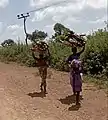Fungwa language
Fungwa, or Ura (Ula; known as Ɓura-wa in Hausa) is a Kainji language in Pandogari, Niger State, Nigeria. The same word is also used for the people; Roger Blench estimated their numbers at no more than 1,000. Farming is the main occupation of the Fungwa while pottery is also an occupation practised by the women. The Fungwa live in the five villages of Gulbe, Gabi Tukurbe, Urenciki, Renga (Ringa) and Utana along the Pandogari–Allawa road in Rafi, Nigeria.[2]
| Fungwa | |
|---|---|
| Ura | |
| Native to | Nigeria |
| Region | Niger State |
Native speakers | (1,000 cited 1992)[1] |
| Language codes | |
| ISO 639-3 | ula |
| Glottolog | fung1245 |
| Fungwa | |
|---|---|
| Person | bu-fúngwà |
| People | a-fungwa |
| Language | cì-fúngwà |
Gallery
 Head of Ura district Ringa
Head of Ura district Ringa Two Ura women carrying firewoods
Two Ura women carrying firewoods Ura women and children carrying things
Ura women and children carrying things Ura village in Ringa district
Ura village in Ringa district Ura women's pots
Ura women's pots
See also
- Pongu language, also known as Rin
References
- Fungwa at Ethnologue (18th ed., 2015) (subscription required)
- Blench, Roger (2012). "The Kainji languages of northwestern and central Nigeria" (PDF). Cambridge: Kay Williamson Educational Foundation.
This article is issued from Wikipedia. The text is licensed under Creative Commons - Attribution - Sharealike. Additional terms may apply for the media files.